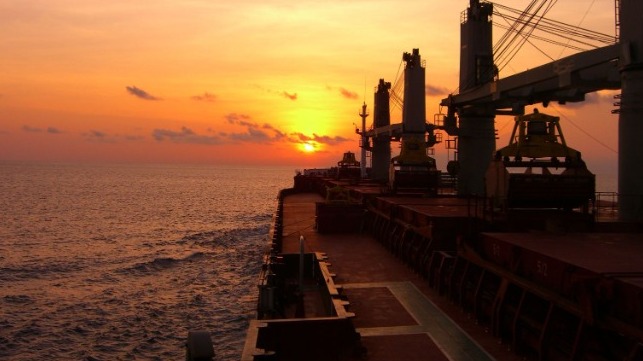Greek Bulk Operator, Chief Engineer Convicted of US MARPOL Violations

A Greek shipping company and the chief engineer of one of the company’s dry bulk carriers became the latest to plead guilty to MARPOL violations in a case brought by the U.S. Justice Department. They were convicted by a court in San Diego for oily bilge water discharge offenses.
New Trade Ship Management and Dennis Plasabas, chief engineer of the bulker Longshore, pleaded guilty to a felony violation of the act for failing to accurately maintain the vessel’s oil record book. Under the terms of the plea agreement, the company will pay a total fine of $1.1 million and serve a four-year probation during which its vessels calling in U.S. ports will be required to implement a robust environmental compliance plan.
The Department of Justice said in a statement that New Trade and Plasabas admitted that oily bilge water was illegally dumped from the Longshore directly into the ocean without being properly processed through required pollution prevention equipment. Oily bilge water typically contains oil contamination from the operation and cleaning of machinery on the vessel. The discharges were not recorded in the vessel’s oil record book as required by law. Sentencing for the defendants is currently scheduled for November 18.
“This case demonstrates our commitment to investigating and prosecuting environmental crimes occurring at sea, no matter how wrongdoers may try to cover them up,” said Assistant Attorney General Todd Kim of the Justice Department’s Environment and Natural Resources Division. “The Department of Justice will continue to work with our partner agencies to ensure polluters are held fully accountable.”
The violations occurred aboard the Longshore, a dry bulk carrier built in South Korea in 2010. The 34,399 dwt vessel is registered in the Marshall Islands. While still under the management of New Trade she apparently was recently renamed Clipper Palma.
The investigation, which was carried out by the U.S. Coast Guard, revealed that on two separate occasions between October and December last year, Plasabas ordered lower-ranking crew members to use a portable pneumatic pump and hose to bypass pollution prevention equipment by transferring oily bilge water from the vessel’s bilge holding tank to the vessel’s sewage tank. It was discharged directly into the ocean.
After discharging the oil, the chief engineer took several steps to hide their actions. He failed to record the transfers and overboard discharges in the vessel’s oil record book. Additionally, the U.S. charged in court that in order to create a false and misleading electronic record as if the pollution prevention equipment had been properly used, Plasabas directed lower-ranking crew members to pump clean sea water into the vessel’s bilge holding tank in the same quantity as the amount of oily bilge water that he had ordered transferred to the sewage tank.
The clean seawater was then processed through the vessel’s pollution prevention equipment as if it was oily bilge water to make it appear that the pollution prevention equipment was being properly used. The electronic records indicate that approximately 9,600 gallons of clean sea water were run through the pollution prevention equipment.

that matters most
Get the latest maritime news delivered to your inbox daily.
“Illegal dumping of oil and falsification of oil record books are egregious violations,” said Captain James W. Spitler, Sector Commander of the Coast Guard Sector San Diego. “Today’s guilty plea should serve as a reminder that the Coast Guard and our partners at the Department of Justice will work tirelessly to hold accountable those that seek to deliberately discharge oil and falsify ship records.”
The U.S. authorities typically bring a few cases each year for similar MARPOL violations. In May 2022, a district court judge in Delaware imposed a $3 million fine and five-year probation on a Greek tanker company and one of its vessels in a similar case dating back to 2019.
